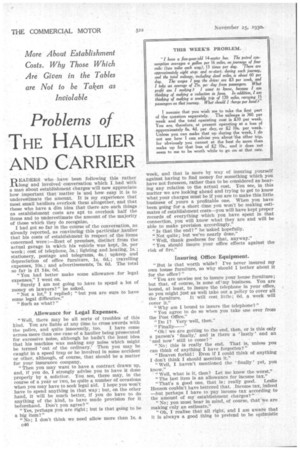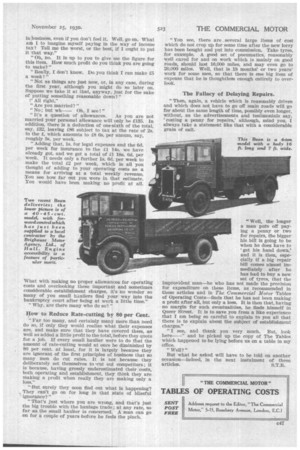Problems of
Page 68

Page 69

If you've noticed an error in this article please click here to report it so we can fix it.
THE HAULIER
AND CARRIER
READERS who have been following this rather long and involved conversation which I had with a man about establishment charges'will now appreciate bow important that matter is and how easy it is to underestimate the amount. It is my experience that most small hauliers overlook them altogether, and that those who have a dim idea that there are such things as establishment costs are apt to overlook half the Items and to underestimate the amount of the majority of those which they do recognize.
I had got so far in the course of the conversation, as already reported, as convincing this particular haulier that his costs of establishment in respect of the items concerned were :—Rent of premises, distinct from the actual garage in which his vehicle was kept, 5s. per week ; cost of telephone, 5s. • lighting and heating, is.; stationery, postage and telegrams, 4s.; upkeep and depreciation of office furniture, 1s. ed.; travelling expenses, 10s. ; and advertisements, is. 6d. The total so fat is £1 14s. Od.
"You had better make some allowance for legal expenses," I went on.
"Surely I am not going to have to spend a lot of money on lawyers?" he asked.
"Not a lot," I replied-; "but you are sure to have some legal difficuties."
"Such as what?"
Allowance for Legal Expenses.
"Well, there may be all sorts of troubles of this kind. You are liable at any time to cross swords with
the police, and quite innocently, too. I have come across more than one ease of a haulier being prosecuted for excessive noise, although he hadn't the least idea that his machine was making any noise which might be termed 'out of the ordinary.' Then you may be caught in a speed trap or be involved in some accident or other, although, of course, that should be a matter for your insurance company.
"Then you may want to have a contract drawn up, and, if you do, I strongly advise you to have it done properly by a solicitor. You see, there may, in the course of a year or two, be quite a number of occasions when you may have to seek legal aid. I hope you won't have to spend anything in that way ; but, on the other hand, it will be much better, if you do have to do anything of the kind, to have made provision for it beforehand. Don't you agree?"
" Yes, perhaps you are right ; but is that going to be a big item?"
"No; I don't think we need allow more than is. a c46
week, and that is more by way of insuring yourself against having to find money for something which you have not foreseen, rather than to be considered as bearing any relation to the actual cost. You see, in this matter we are looking ahead and trying to get to know what your charges must be if you are to make this little business of yours a profitable one. When you have been going for a short time you won't be making estimates of establishment costs—you will have kept proper records of everything which you have spent in that connection, you will know what they are and will be able to make provision accordingly."
"Is that the end? " he 'asked hopefully.
'Not quite; but We've nearly done." "Well, thank goodness for that, anyway."
"You should insure your office effects against the risk of fire."
Insuring Office Equipment.
"But is that worth while? I've never insured my own house furniture, so why should I bother about it for the office?"
"You are unwise not to insure your house furniture; but that, of course, is none of my business. You are bound, at least, to insure the telephone in your office, so you might just as well take out a policy to cover all the furniture. It will cost little; Od. a week will cover it."
"Why am I bound to insure the telephone?"
" You agree to do so when you take one over from the Post Office."
"Do I? Very well, then."
"Finally—"
" Oh 1 we are getting to the end, then, or is this only a parson's 'finally,' and is there a 'lastly' and an 'and now' still to come?"
"No; this is really the end. That is, unless you can think of anything I have forgotten?"
"Heaven forbid! Even if I could think of anything I don't think I should mention it."
"Well, I haven't mentioned the ' finally ' yet, you know."
" Well, what is it, then? Let me know the worst." .
"The last item is an allowance for income tax."
"That's a good one, that is; really good. Leslie Henson couldn't have bettered that. Income tax, indeed —but perhaps I have to pay income tax according to the amount of my establishment charges?"
"No; you must bear in mind, of course, that we are making enly, an estimate."
"Oh, I realize that all right, and I am aware that it is always a good thing to pretend to be optimistic in business, even if you don't feel it. Well, go on. What am I to imagine myself paying in the way of income tax? Tell me the worst, or the best, if I ought to put it that way."
"Oh, no. It is up to you to give me the figure for this item. How much profit do you think you are going to make?"
"Really, I don't know. Do you think I can make 15 a week?"
"Not as things are just now, or, in any case, during the first year, although you might do so later on. Suppose we take it at that, anyway, just for the sake of putting something reasonable down?"
All right."
"Are you married?"
"No; but wh Oh, I see!"
"It's a question of allowances. As you are not married your personal allowance will only be £135. In addition, there is a deduction of one-sixth of the total, say, £32, leaving £86 subject to tax at the rate of 2s. in the £, which amounts to £8 6s. per annum, say, roughly 3s. per week.
"Adding that, 1s. for legal expenses and the 6d.
per week for insurance to the 14s. we have already got, and we get a total of £1 18s. 6(1. per week. It needs only a further is. 6d. per week to make the total £2 per week, which is all you thought of adding to your operating costs as a means for arriving at a total weekly revenue. You see how far out you were in that estimate. You would have been making no profit at all.
What with making no proper allowances for operating costs and overlooking these important and sometimes considerable establishment charges, it's no wonder so many of you small hauliers find your way into the bankruptcy court after being at work a little time."
"Why, are there many who do so?
How to Reduce Rate-cutting by 80 per Cent.
" Far too many, and certainly many more than need do so, if only they would realize what their expenses are, and make sure that they have covered them, as well as added a little profit to the total, before they quote for a job. If every small haulier were to do that the amount of rate-cutting would at once be diminished by 80 per cent, at least, for it is largely because they are ignorant of the first principles of business that so many men do cut rates. It is not because they deliberately set themselves to -cut out competitors; it is because, having grossly underestimated their costs, both operating and establishment, they think they are making a profit when really they are making only a loss."
"But surely they soon find out what is happening? They can't go on for long in that state of blissful ignorance?."
"That's just where you are wrong, and that's just the big trouble with the haulage trade; at any rate, so far as the small haulier is concerned. A man can go on for a couple of years before he feels the pinch. "You see, there are .several large items of coat which do not crop up for some time after the new lorry has been bought and put into commission. Take tyres, for example. A good set of pneumatics, reasonably well cared for and on work which is mainly on good roads, should last 16,000 miles, and may even go to 20,000 miles. Well, that is 18 months' or two years' work for some men, so that there is one big item of expense that he is thoughtless enough entirely to overlook.
The Fallacy of Delaying Repairs.
"Then, again, a vehicle which is reasonably driven and which does not have to go off main roads will go for about the same length of time, possibly even longer, without, as the advertisements and testimonials say, 'costing a penny for repairs,' although, mind you, I always take a statement like that with a considerable grain of salt.
"Well, the longer a man puts off paying a penny or two for repairs, the bigger his bill is going to be when he does have to get his hand down,' and it is then, especially if a big repair bill comes almost immediately after he has had to buy a new set of tyres, that the improvident man—he who has not made the provision for expenditure on these items, as recommended in these articles and in The Commercial Motor Tables of Operating Costs—finds that he has not been making a profit after all, but only a loss. It is then that, having no margin for such eventualities, he finds himself in Queer Street. It is to save you from a like experience that I am being so careful to explain to you all that there is to explain about the subject of establishment charges."
"I see, and thank you very much. But, look here—" and he picked up the copy of The Tables which happened to be lyingbefore us on a table in my office.
" Well?"
But what he asked will have to be told on another occasion—indeed, in the next instalment of these articles. S.T.R.












































































































